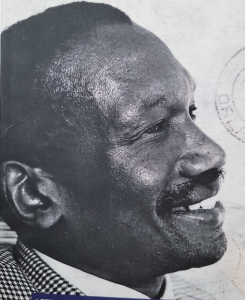Vrij Nederland, August 22, 1959

Robert Mangaliso Sobukwe 1924-1978
Introduction
In 1959 the Dutch weekly Vrij Nederland published an interview with PAC leader Sobukwe by a special correspondent (Karel Roskam) in South Africa.
Below the integral English translation.
Vrij Nederland, August 22, 1959
Sobukwe:
A New South African Leader
Working together with whites is not the solution
(By a special correspondent)
‘Oppression in South Africa should be ended by black people and not white people or any other group,’ states Robert Sobukwe, president of the recently founded Pan Africanist Congress and lecturer at the University of the Witwatersrand.
‘Black people must take a united stand to end white rule and white oppression. To this end tribalism must be overcome and a new national African solidarity, a black nationalism, must be cultivated.
Pan Africanists do not acknowledge the existence of different races – there is only one human race – but in South Africa there is the reality of three national groups: the Indians and Europeans as foreign minorities and the Africans as the indigenous population and oppressed majority.
The Indians did not come as conquerors but as coolies. Nevertheless, the leadership of their group fell into the hands of a conservative middle-class of merchants openly declaring their cultural superiority over black people.
White people, by contrast, were the conquerors and are still the oppressors. Collaboration is impossible because the white minority is not interested in change to the status quo.’
Pan-Africanism differs significantly from the other opposition movements here in the Union of South Africa. The United Party is the only opposition recognized as such by the National Party, Verwoerd’s ruling party. It is the only opposition group represented in parliament, but unsurprisingly it is a group which actually cannot be labelled opposition. Fact is that the United Party adheres to a racial policy that hardly deviates from Verwoerd’s policy of apartheid. Certainly, there are differences, but these differences are not fundamental.
Sir De Villiers Graaf, leader of the United Party, declared on 18 May 1959 that his party continues to respect the concept of white supremacy, that extension of non-white right to vote can never mean for non-whites to have seats in parliament. Generally the United Party, representing the British section of the white population, is considered to be an instrument to protect the interests of industrialists and mine owners.
Liberal Party and Labour Party
The Liberal Party, the only political organization in South Africa with membership open to all races and with strictly democratic procedures, does not win mass support and will never win more supporters as long as the party is not more focused on economic equality. ‘Equal opportunities for everyone,’ according to Sobukwe, ‘does not mean a thing if the white man earns five thousand guilders and the black man nothing.’
The economic inequality between population groups in South Africa is a striking phenomenon, and to such an extent that no attempt to politically organize the non-whites will succeed if they are not offered an economic program.
However, there are signs – in particular at the last annual liberal congress in April this year – that a change for the better is taking place in circles of well-meaning liberal intellectuals. Absolute equality between whites and non-whites, in the struggle for ending discrimination and segregation, has not yet taken place sufficiently. Typical examples I heard are the instances of whites, despite the fact they were leading the struggle for better economic conditions and higher wages for blacks, being outraged by requests from their employees for pay increase. However, it is only fair to say that the liberals play a not insignificant role – if only for constantly waking up the white conscience that is falling repeatedly asleep.
The socialist party has virtually ceased to exist since the crushing defeat at the 1958 elections. That defeat can mainly be attibuted to the failure of the party to confirm itself as a broad working-class movement. Instead the Labour Party has almost invariably presented itself as protector of white workers, as illustrated by the slogan during the appalling episode of the 1922 miners’ strikes (suppressed in blood by the humanist Smuts). The slogan ran: ‘ Workers, unite to keep South Africa white.’
The Congress Movement
Significant opposition in South Africa has till now been formed by the Congress Movement. It was initiated in 1912 by the African National Congress (ANC). The now nearly 50-year-old mass organization has constantly attracted interest from friend and foe. It constitutes a formidable force among Africans. The president, ex-chief Luthuli, a devout Christian, is a sympathetic appearance and even highly appreciated by some nationalists. Luthuli is perhaps the only politician of stature who as president of a South African republic would secure the consent of the majority of the population. The congress movement, however, is far from homogenous and certainly not ‘ Christian’, like its ‘Chief’ – the title Luthuli was given by his supporters.
Besides the Indian Congress and an inconsequential organization of coloureds the congress movement includes the only multi-racial trade union organization plus the Congress of Democrats (COD), a white organization.
This last mentioned small group of left-wing radicals is led by members of the in 1952 dissolved (and shortly afterwards banned) Communist Party. Through a national and regional council these Stalinists – for that is what South African communists turn out to be – succeed in playing a dominant role in the congress movement with its mass support. The number of paying ANC members is an estimated 250,000, and furthermore, the number of supporters is substantial. The communist party has a good track record as far as the struggle against racial prejudice in South Africa is concerned. However, in particular the communists seem to oppose the formation of one single Congress Movement with membership open to all regardless of race, because then their influence will inevitably wane. It is undeniable that there are many Congress Movement members, in particular students and other young people, who are just moderately pleased with the current state of affairs and who ask for one multi-racial congress.
Sense of self-esteem
‘And this is precisely the objection we Africans have to the Congress Movement,’ according to the young intellectual Sobukwe. ‘The Congress does not strengthen the identity of Africans. It is expected that where whites have an impact an evolution will take place with the use of whites. For three hundred years the white man was superior. Is it any wonder that the black man somehow, deep down, believes in the superiority of the white man? Of course, among white people there are the so-called ‘intellectual converts’, who are fully on the side of the black man. But even in the Congress Movement white members hope (mostly unconsciously) for a delay in the violent overthrow of the current rule. For this reason any black political organization is doomed to powerlessness for psychological and material reasons when white members are admitted. Moreover, black intellectuals have often been tempted, and can still be tempted, to compromise with the whites. The fact remains that the psychological climate is what it is, that the white radical, the white liberal and the white socialist are still viewed by many blacks as the arbitrator, the conciliator.’
‘The Africans need to find themselves, to get a sense of self-esteem, to develop similar perspectives. We must be nation conscious, not class conscious; the rich non-whites are oppressed as well.
We are not anti-white, although in a bloody revolution the attitude of some sympathetic whites will not be taken into consideration. But also after that we will not adopt an anti-white attitude. We – I repeat – do not believe in race.’
‘Our post-revolutionary society will be a socialist democracy, with the Western conceptions about democracy, but with a rejection of the capitalist system.
Regarding our population and immigration policies, Africans will without a doubt abide by the concept of: rather all living together in one room than throwing out one person. Furthermore, in the long term we aim to abolish borders within the African continent,’ said the young intellectual Sobukwe.
The great significance of his Pan-Africanist Congress is that it poses a threat to the monopoly position of the ANC. The ANC will have to wake up from its lethargy by reappraising its position. Sobukwe’s appearance has certainly helped to accelerate the inherent political crisis South Africa is going to face.
_____________________________________________________________________________
Translation into English: HippoLingo.
12 February, 2023
